Table of Contents
When the heart beats rapidly, it is common to experience palpitations, which manifest themselves as a sensation of an intense heartbeat or a rapid pulse. The causes of palpitations are varied, ranging from everyday factors such as caffeine consumption to more complex situations such as cardiac arrhythmias. Although seeking medical attention is essential if this occurs frequently, there are home remedies and natural ways to help lower the heart rate.
How to lower heart rate immediately
The average heart rate in adults ranges between 60 and 100 beats per minute (bpm). When it exceeds 100 bpm, it is considered tachycardia, often manifesting through palpitations. Various reasons may cause these palpitations, including:
Lifestyle triggers
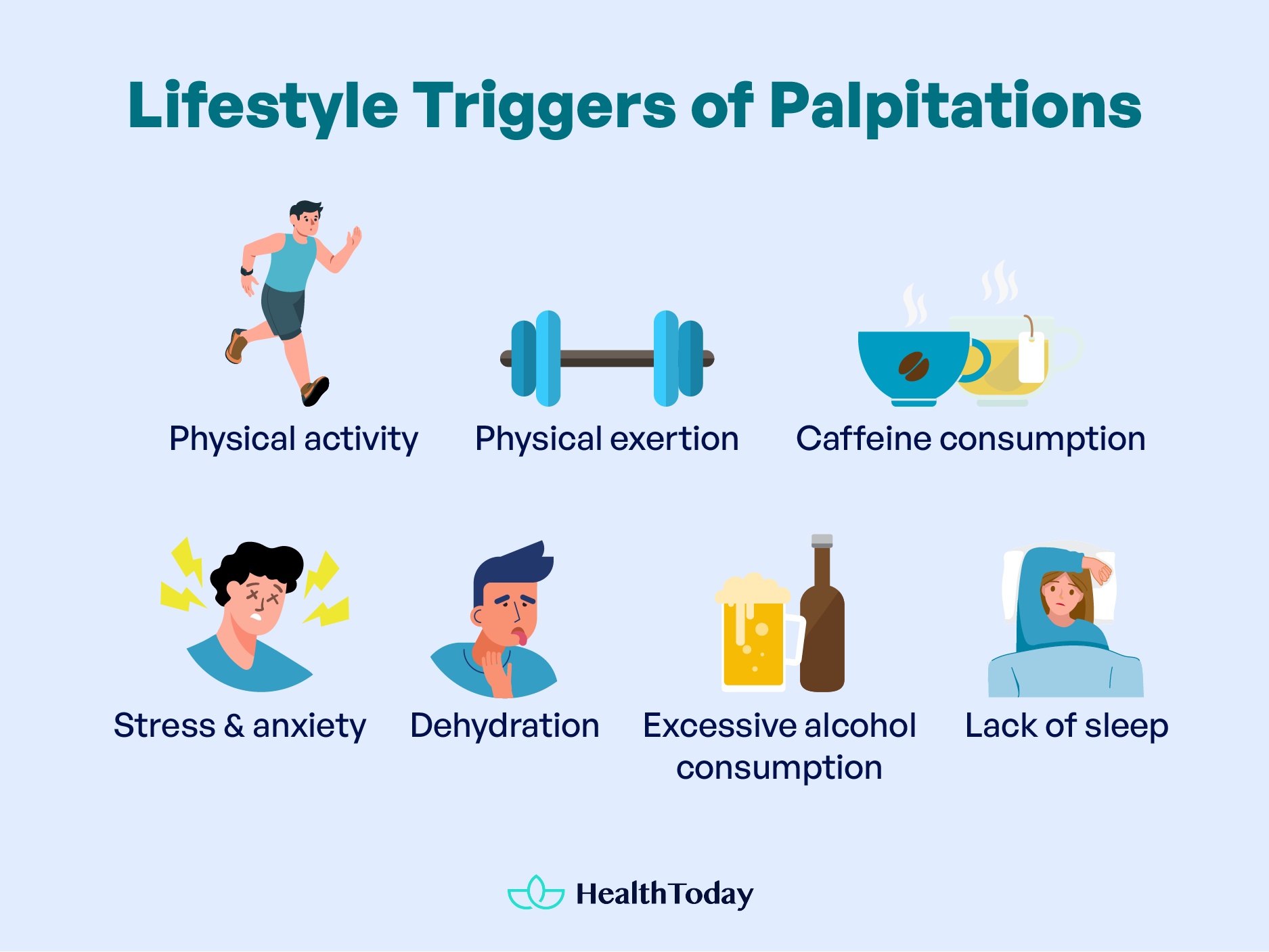
- Physical Activity: Both aerobic activities, such as running, and anaerobic activities, like sprints, can trigger palpitations.
- Physical Exertion: Activities requiring strength, such as weightlifting, can also increase the heart rate.
- Caffeine Consumption: Drinks like coffee and sodas contain caffeine, a stimulant that temporarily raises the heart rate (1).
- Stress and Anxiety: Stressful, emotional situations can activate the sympathetic nervous system, generating increased mental activity and sometimes palpitations.
- Dehydration: Lack of hydration affects blood circulation, contributing to an increase in heart rate. (2)
- Excessive Alcohol Consumption: It can affect the cardiovascular system, raising the heart rate if consumed in excess (3).
- Lack of Sleep: Sleep deprivation and fatigue can impact the cardiovascular system and trigger palpitations. (4)
Diseases that cause an increase in heart rate
- Fever: Fever, as part of the body’s inflammatory response, can raise the heart rate.
- Hyperthyroidism: Hyperthyroidism causes an increase in the production of thyroid hormones, such as T3 and T4. These hormones stimulate the cardiovascular system, increasing the heart’s sensitivity to catecholamines and stimulating cardiac contraction, increasing heart rate. (5)
- Cardiac Arrhythmias: Atrial fibrillation is the most common cause in elderly people (6).
- Cardiovascular Diseases: Heart failure, valvular heart disease, and electrical alterations, among other causes, can cause episodes of palpitations (7).
- Anemia: Heart rate increases in anemia due to hypoxia-stimulated receptors and increased sympathetic activity (8).
- Chronic Obstructive Pulmonary Disease (COPD): Continuous lack of oxygen triggers the release of norepinephrine, causing the nervous system to become more active, leading to a faster heartbeat (9).
Some methods can immediately reduce the heart rate if you experience palpitations due to lifestyle triggers. Some techniques include (10):
- Deep Breathing: Inhale slowly through the nose, expanding the abdomen, and exhale slowly through the mouth. This allows you to focus on breathing and helps reduce the heart rate caused by stress.
- Vagus Nerve Stimulation Maneuvers: Stimulate the vagus nerve with techniques such as holding your breath or submerging your face in cold water. This relaxes blood vessels and, in turn, decreases the heart rate.
- Valsalva Maneuver: Inhale deeply, strain as if having a bowel movement, hold your breath, and exhale slowly. Repeat this exercise 10 times or do it until palpitations decrease.
- Focus on a Task: Engage in a relaxing activity or concentrate on a single task to distract the mind from stress.
- Progressive Muscle Relaxation (PMR): This method is based on the relationship between muscle tension and psychological states of nervousness or high mental activity, clinically presented with palpitations and anxiety. It consists of tensing and relaxing muscle groups to achieve a sense of calm. To do this, be in a comfortable and quiet place. Start by tensing your feet for 10 seconds and then relax them, gradually moving up from the bottom to the top with different muscle groups in the body. You will feel a sense of calm and tranquility.
These techniques can be helpful when experiencing palpitations due to stress or anxiety but are less useful in the case of diseases. If palpitations occur frequently, you should consult with your primary care physician.

How to lower resting heart rate
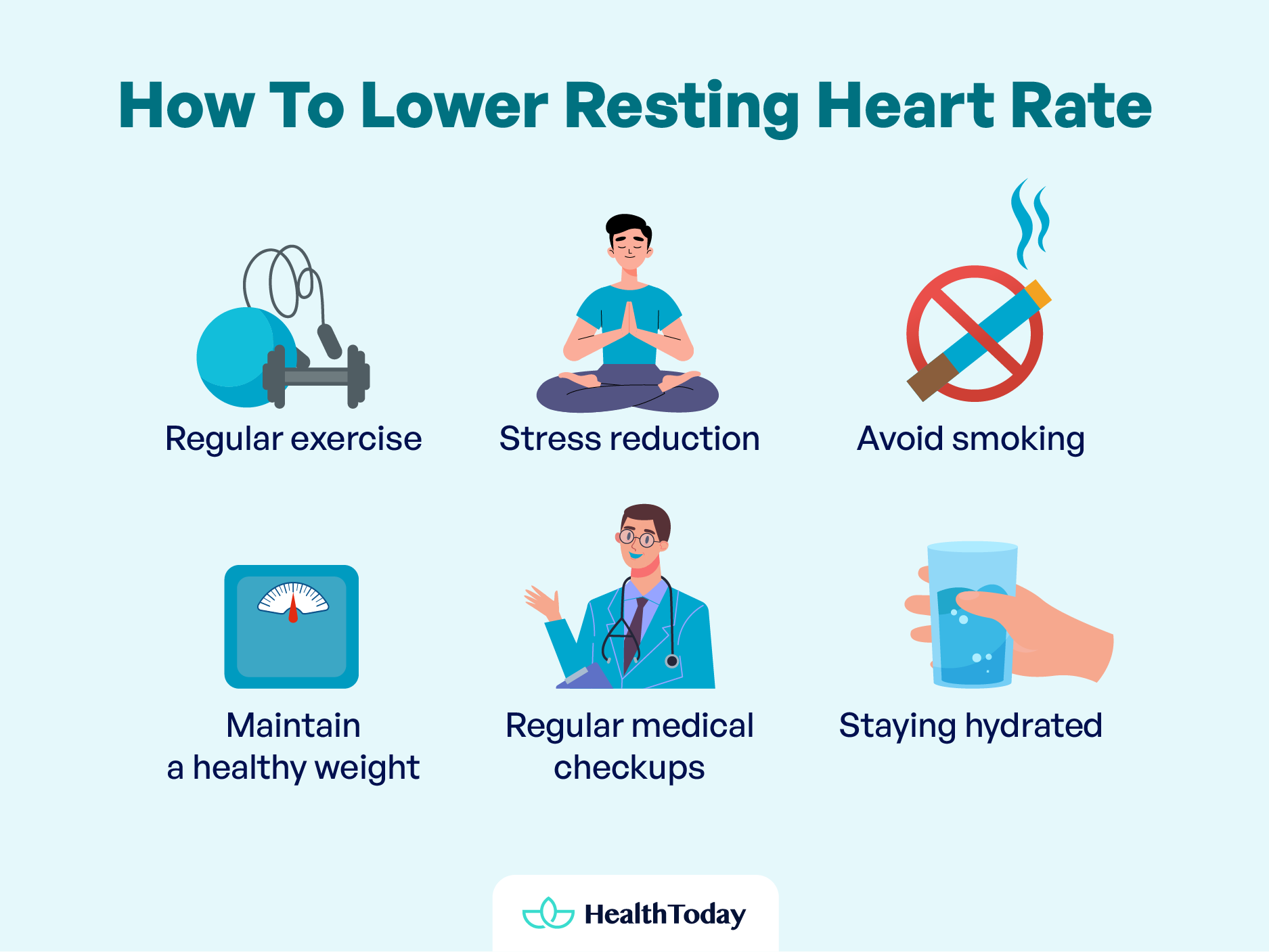

People who exercise regularly tend to have a lower heart rate than those who do not engage in any physical activity. Maintaining a low resting heart rate is essential for a healthy lifestyle, as it contributes to the optimal functioning of the cardiovascular system. This is because a trained heart optimizes its resources to pump blood to the rest of the body, requiring fewer beats to deliver the same amount of blood as an untrained heart. In athletes, the heart rate can be as high as 35-40 beats per minute during nighttime rest periods.
By adopting six healthy habits, you can reduce your resting heart rate and help maintain a healthy heart (10, 11, 12):
- Regular exercise: Engaging in activities such as brisk walking, swimming, or cycling can temporarily increase your heart rate, but regular exercise tends to lower your resting heart rate over time. Check out Best Exercises For Heart Health.
- Stress reduction: Practicing relaxation response, meditation, tai chi, and other stress-reducing techniques decreases resting heart rate over time.
- Avoid smoking: Smokers tend to have a higher resting heart rate due to the action of nicotine. This substance stimulates the release of adrenaline, activates the sympathetic nervous system, constricts blood vessels, and displaces oxygen from red blood cells, causing the heart to increase its heart rate. Quitting smoking is crucial in reducing this negative impact.
- Maintain a healthy weight: The larger the body, the more work the heart must do to supply blood. Losing weight can help reduce an elevated resting heart rate.
- Regular medical checkups: Regular medical checkups allow early detection of diseases that could increase the heart rate. Early diagnosis and optimal treatment allow the heart to function properly.
- Staying hydrated: Adequate hydration allows the heart to have the necessary volume to meet the body’s demands. Lack of hydration or excessive consumption of salt and sugars can increase fluid elimination due to a diuretic effect, increasing the heart rate.
These fundamental principles can help reduce your resting heart rate and promote optimal cardiac function. In addition, it is beneficial to limit your intake of caffeine and alcohol, which can cause palpitations and increase your heart rate. If your resting heart rate consistently exceeds 90 beats per minute or you feel palpitations and chest pain, it is advisable to consult a physician.





Foods to avoid if you have heart palpitation
If you have a history of recurrent palpitations, it is helpful to implement strategies to limit the consumption of foods that may trigger them. Trigger foods vary from person to person, so identifying which foods trigger palpitations is essential to avoid them. Although there is no single diet for palpitations, reducing the consumption of certain foods can be beneficial. Here are some recommendations to follow.
Caffeinated foods and beverages
Reducing caffeine intake is essential if you suffer from palpitations. Caffeine acts as a stimulant, interacting with the sympathetic nervous system and increasing heart rate and blood pressure. Caffeine is found in:
- Coffee.
- Tea.
- Energy drinks.
- Sports drinks.
Limiting consumption of these products can be crucial to stabilize the situation if you experience palpitations.
Excessively spicy foods
For those who regularly consume spicy foods, being aware and limiting your intake is helpful. Spicy foods can trigger a physiological response that manifests in increased heart rate. Some foods to avoid are:
- Hot peppers such as jalapeños, habaneros, and serranos.
- Hot sauces such as Tabasco sauce or chili hot sauce.
- Hot spices such as turmeric and ginger.
Processed snacks
Avoid snacks such as chips, microwavable meals, and candy, as they often contain high levels of sugar, salt, and unhealthy fats. Opting for whole foods can improve overall heart health and reduce the frequency of palpitations.
Alcohol
Alcohol can generate palpitations in susceptible individuals, as it induces arterial vasodilation. In response to the decrease in blood pressure, the heart may increase the heart rate to maintain adequate blood flow. In addition, alcohol acts as a diuretic, increasing diuresis and contributing to dehydration, which can increase heart rate. Limiting alcohol consumption is helpful to avoid the symptoms of palpitations.
Soft drinks
Due to their high caffeine and sugar content, it is advisable to limit the consumption of conventional soft drinks if you want to avoid an elevated heart rate.
Adopting a diet that prioritizes whole foods and limits sugar, salt, and added fats can benefit overall heart health and reduce the frequency of palpitations.
To lower your heart rate, it is important to make changes in your lifestyle. In addition to avoiding foods high in caffeine, salt, and sugar, as well as alcohol, you should integrate more physical activity, sleep at least 7 hours, avoid smoking, and manage your stress levels through the techniques mentioned above. This will not only reduce your heart rate but will also positively impact your overall health.





Heart-healthy foods: 7 foods to support a healthy heart and maintain a balanced heart rate
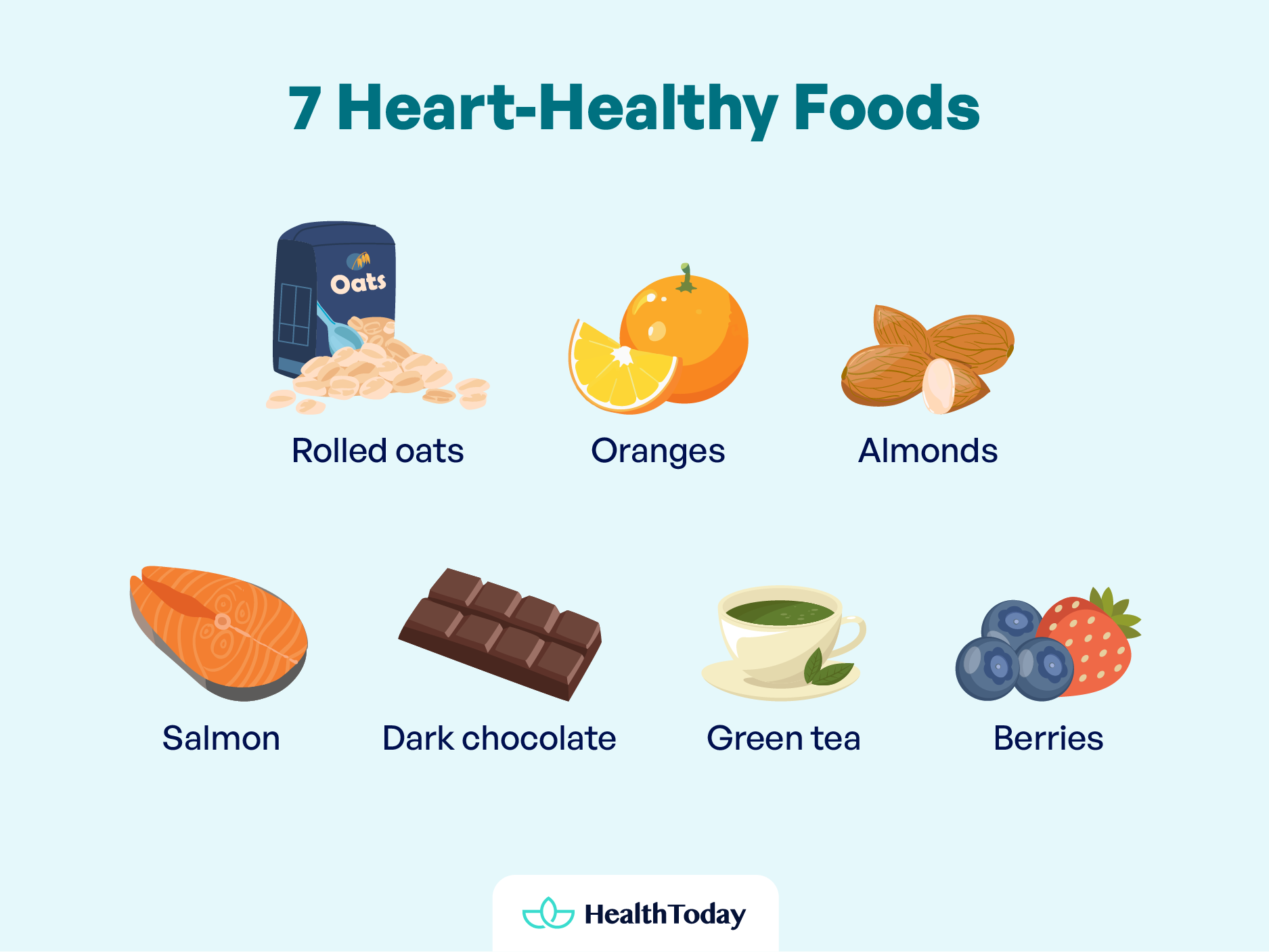

Incorporating healthy foods into your daily diet is essential, as it allows you to take advantage of their benefits for cardiovascular health. These foods are recognized for their cardioprotective properties, being crucial for preventing long-term heart disease and reducing the risk of complications such as resting tachycardia, commonly seen in elderly patients due to atrial fibrillation from heart failure. These foods are:
- Rolled oats: Oatmeal is a whole grain cereal that contains fiber and nutrients that can lower cholesterol levels and promote a healthy heart.
- Oranges: Oranges are citrus fruits that contain vitamin C and antioxidants, which promote heart health and reduce blood vessel inflammation.
- Almonds: Almonds are nutritious nuts that provide healthy fats, fiber, and magnesium, which help relax blood vessels and reduce heart rate.
- Salmon: Salmon is a fatty fish rich in omega-3 fatty acids, known for its heart-healthy benefits, such as reducing inflammation and promoting a regular heart rhythm.
- Dark chocolate: Dark chocolate contains flavonoids and antioxidants that improve blood flow, lower blood pressure, and reduce the risk of heart disease.
- Green tea: Green tea is rich in catechins, antioxidants associated with a lower risk of heart disease. The caffeine in green tea may also improve heart function and reduce heart rate.
- Berries: Berries, such as strawberries, blueberries, and raspberries, are packed with antioxidants that reduce inflammation and improve heart health.
Including these foods in your diet will allow you to eat a balanced, healthy, and cardioprotective diet. Combined with healthy habits, they will contribute to enhanced life quality.
1. Is aspirin good for heart palpitations?
Aspirin is not typically recommended for heart palpitations. It’s essential to consult with a healthcare professional for personalized advice.
2. Why does drinking water lower heart rate?
Proper hydration helps maintain blood volume, supporting the heart’s ability to pump efficiently and potentially lowering heart rate. Dehydration leads to increased heart rate because blood volume is not optimal.
3. How to stop heart palpitations during a period?
Maintaining a healthy lifestyle, managing stress, and avoiding triggers such as caffeine and smoking can help alleviate heart palpitations during menstruation.
4. How to stop heart palpitations during pregnancy?
Pregnant women should consult their healthcare provider for guidance on managing heart palpitations during pregnancy, which may vary based on individual health conditions.
5. How to stop focusing on the heartbeat?
Practicing mindfulness techniques, such as meditation and deep breathing, can help shift your focus away from your heartbeat and promote relaxation. To be useful, you must practice these activities daily to improve concentration and stop focusing on your heart rate.
6. How to stop your heart from beating fast?
Deep breathing exercises, relaxation techniques, and avoiding stimulants like caffeine can help slow down a fast-beating heart. If symptoms persist, seek medical advice.





Summary
Reducing heart rate in a sustained and natural way involves a daily effort to adopt new habits. Increasing physical activity, changing dietary habits, limiting caffeine intake, reducing smoking, and managing stress through techniques such as controlled breathing, yoga, or the method of your preference is essential to maintaining a healthy heart rate, protecting both the heart and the rest of the body.
Incorporating cardioprotective foods such as berries, avocado, green tea, and oatmeal helps prevent the leading cause of tachycardia in the elderly: atrial fibrillation due to heart failure. Additionally, it is crucial to undergo regular medical check-ups to rule out diseases that may cause palpitations. Timely diagnosis and treatment are essential to avoid serious health complications.





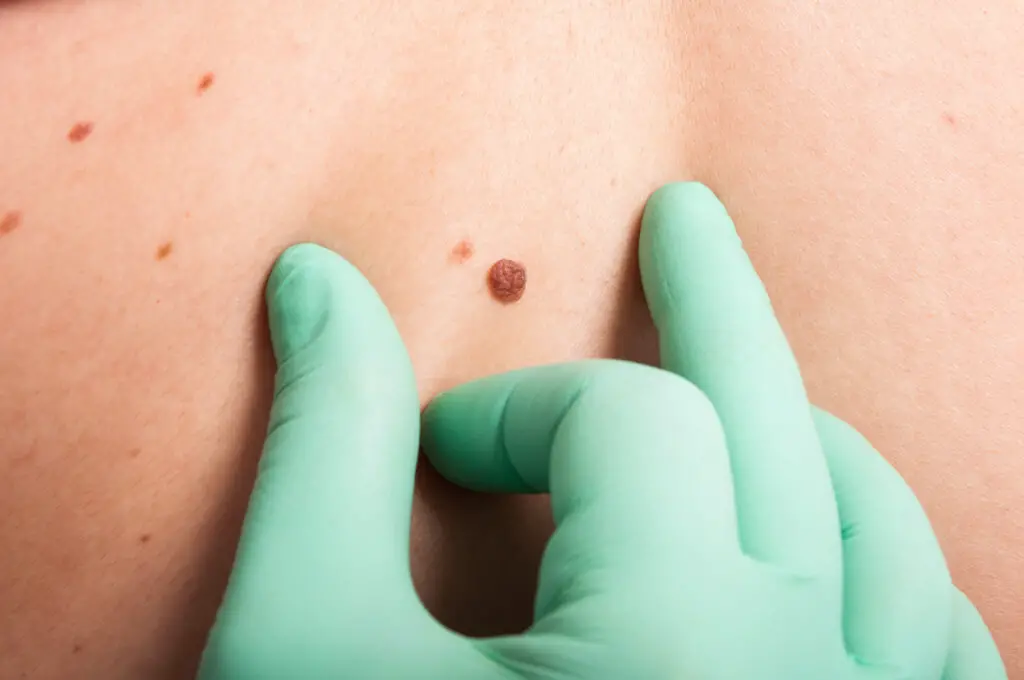

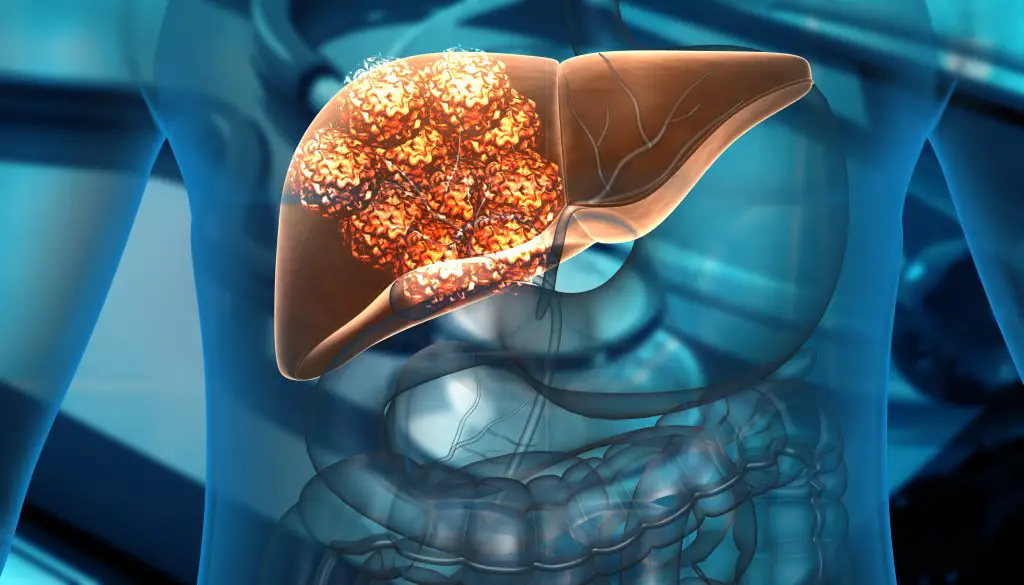


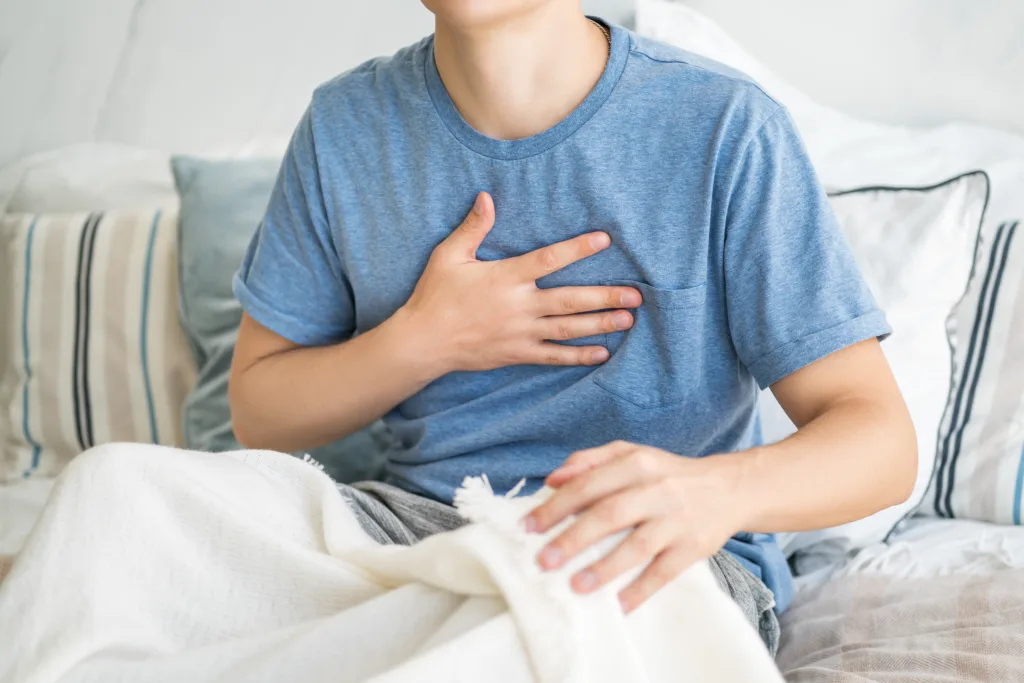
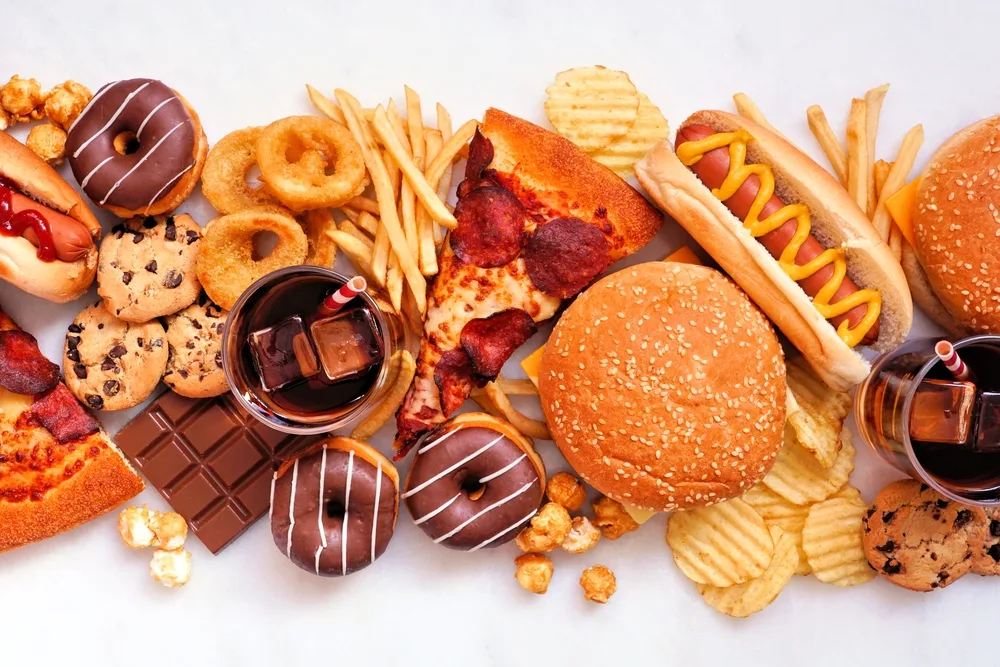
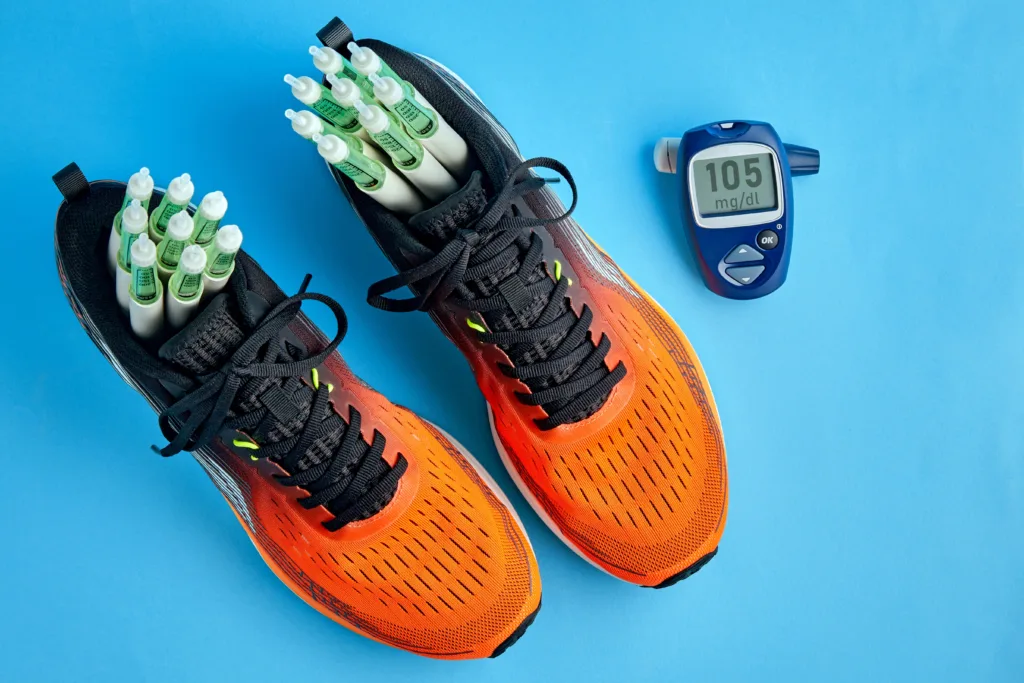


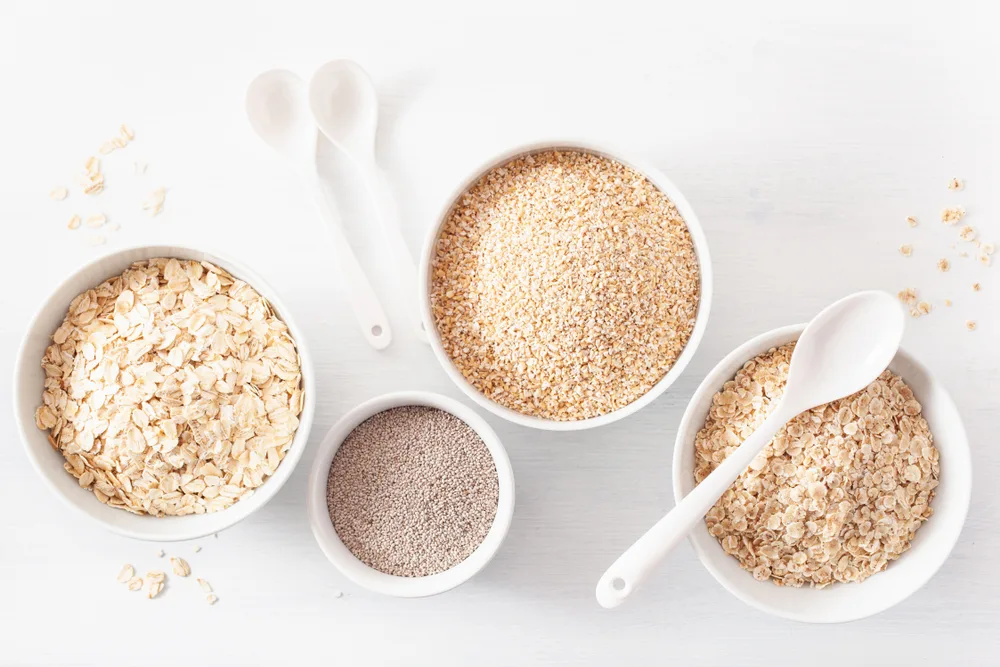

Comments
0